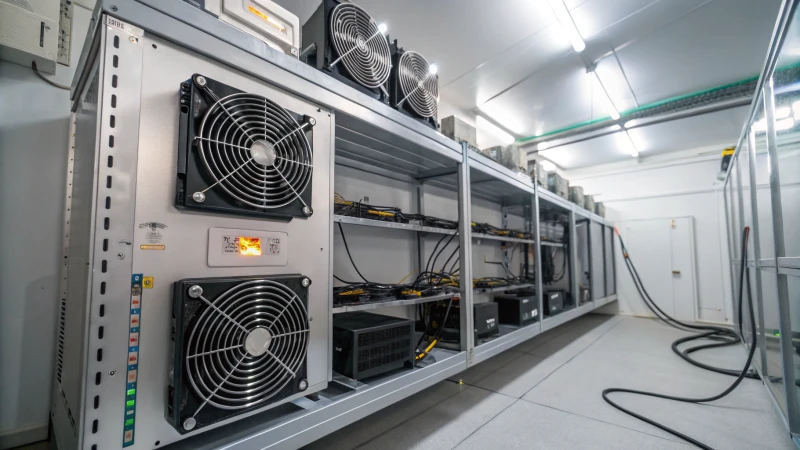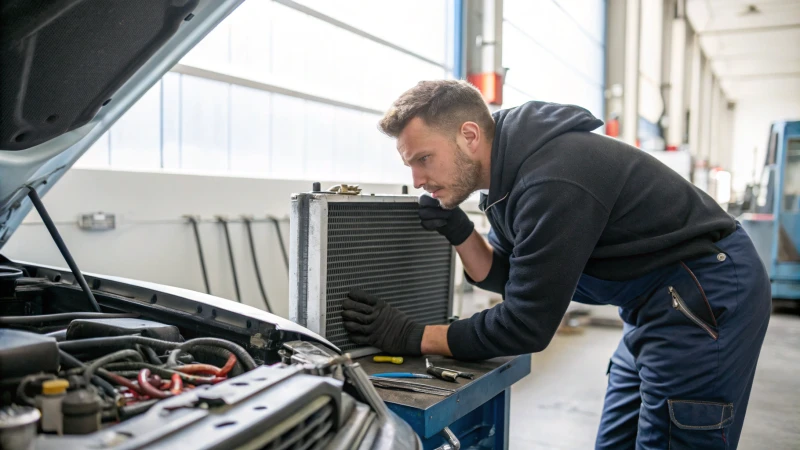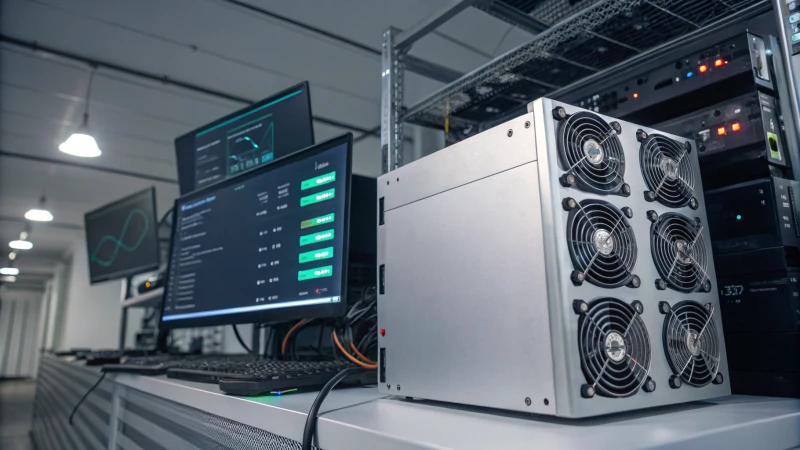
If you’re investing in cryptocurrency mining, proper maintenance of your equipment is crucial.
The Antminer L9 requires regular maintenance to function optimally, including temperature control, cooling system upkeep, power supply checks, and firmware updates. Following these guidelines will help maximize your mining efficiency and protect your investment.
In this post, we’ll explore each of these maintenance aspects in detail, ensuring that you have all the knowledge necessary to keep your Antminer L9 running smoothly.
How Does Temperature Affect Antminer L9 Performance?
Understanding the impact of temperature on Antminer L9 performance is crucial for maximizing efficiency and longevity.
Temperature affects Antminer L9 performance by influencing its operational efficiency and risk of damage. Maintaining optimal conditions is key to ensuring effective mining and reducing downtime.

The Importance of Temperature Control
Temperature plays a critical role in the performance of the Antminer L9. Operating within the optimal range of 5°C to 45°C is essential for maintaining efficiency and preventing hardware damage.
When temperatures rise beyond this threshold, miners can experience reduced hash rates, which impacts their profitability. Additionally, excessive heat can increase power consumption, further diminishing returns.
For instance, when the temperature exceeds 45°C, the Antminer L9 may initiate thermal throttling, reducing its performance to prevent overheating. This can lead to significant downtime and lost mining opportunities.
Effects of Humidity on Performance
While temperature is crucial, humidity also affects the Antminer L9’s operation. The recommended humidity levels are between 5% and 95%.
Excessive humidity can lead to condensation, potentially causing electrical shorts and damage to sensitive components. Conversely, too low humidity might create static electricity, which can also harm the miner.
| Humidity Level | Impact on Performance |
|---|---|
| 5% – 95% | Optimal operation |
| >95% | Risk of condensation |
| <5% | Risk of static damage |
Best Practices for Temperature Management
To optimize the Antminer L9’s performance, consider implementing the following practices:
- Airflow Management: Ensure adequate airflow around the miner. Avoid enclosed spaces without ventilation.
- Cooling System Maintenance: Regularly clean fans and ensure they are functioning properly.
- Environmental Monitoring: Utilize temperature and humidity sensors to track conditions in real-time.
- Location Selection: Place the miner in a cool, dry location to maintain ideal conditions.
By adhering to these practices, miners can significantly enhance the lifespan and efficiency of their Antminer L9 units.
Monitoring Performance Metrics
Monitoring performance metrics is crucial for understanding how temperature affects the miner’s operation. Key metrics to track include:
- معدل التجزئة: Target around 16 GH/s for optimal performance.
- استهلاك الطاقة: Aim for approximately 3360W to prevent overloading.
- Error Logs: Regularly review logs for any signs of overheating or operational issues.
Implementing a structured approach to monitor these metrics can help mitigate risks associated with temperature fluctuations and maintain consistent mining performance.
For more insights on enhancing your mining setup, check out optimizing ASIC miners.
What Are the Best Practices for Cooling System Maintenance?
Maintaining a vehicle’s cooling system is crucial for preventing overheating and ensuring smooth engine performance. Here are best practices to keep your system in top shape.
To maintain your vehicle’s cooling system effectively, regularly check fluid levels, inspect hoses, clean the radiator, change coolant as needed, and monitor thermostat and water pump functionality.

Understanding the Importance of Cooling System Maintenance
Maintaining a vehicle’s cooling system is critical for preventing overheating and ensuring the engine operates at optimal temperatures. The cooling system not only regulates engine temperature but also protects it from wear and tear. Regular maintenance helps avoid costly repairs down the line. For more details on engine health, refer to engine management systems.
Regular Inspections
Performing regular inspections is essential to identify potential issues before they escalate. Here are some inspection points:
| Inspection Item | Frequency | Notes |
|---|---|---|
| Coolant Level | شهرياً | Check for low levels and top up as needed. |
| Hoses and Clamps | Every 6 months | Look for cracks or signs of wear. |
| Radiator Condition | سنوياً | Ensure it is free of debris and leaks. |
Fluid Checks and Changes
Maintaining the proper coolant level is vital. Here’s what you need to do:
- Check Coolant: Ensure the coolant is at the recommended level and in good condition. If it’s discolored or has particles, it may need changing.
- Change Coolant: Typically, coolant should be replaced every 2 to 5 years, depending on the manufacturer’s recommendations.
- Flush System: A full system flush is recommended to remove old coolant and any contaminants that could hinder performance. For guidelines, check out coolant flushing tips.
Thermostat and Water Pump Checks
The thermostat and water pump play crucial roles in the cooling system’s efficiency:
- Thermostat: Ensure it opens and closes at the correct temperatures. A malfunction can lead to overheating.
- Water Pump: Check for leaks or noises, as a failing water pump can cause coolant circulation issues.
Maintaining Radiator Health
The radiator dissipates heat from the coolant, which is essential for engine cooling:
- Cleaning: Regularly clean the radiator to remove any debris that may block airflow. A blocked radiator can lead to overheating.
- Pressure Testing: Conduct a pressure test on the radiator to check for leaks. This should be done at least once a year.
Seasonal Considerations
With changing seasons, specific checks are necessary:
- Summer: Ensure that the cooling system can handle higher temperatures by checking fluid levels and ensuring proper airflow.
- Winter: Use antifreeze to prevent coolant from freezing. The coolant mixture should be suitable for your climate conditions.
For seasonal tips, explore seasonal vehicle maintenance.
Professional Maintenance and Support
While DIY checks are valuable, professional maintenance should not be overlooked:
- Schedule a professional inspection every year to ensure that all aspects of your cooling system are functioning properly.
- Keep records of maintenance performed to maintain warranties and provide useful information if issues arise later. For more on professional services, consider visiting auto service centers.
Why Is Regular Firmware Updating Important for the Antminer L9?
Regular firmware updates are essential for the optimal operation of your Antminer L9. They enhance performance, improve security, and ensure stability, making them a key aspect of effective mining management.
Regular firmware updating is crucial for the Antminer L9 as it enhances performance, strengthens security against vulnerabilities, fixes bugs for stability, and ensures compatibility with new features while maintaining warranty compliance.

Enhancing Performance with Firmware Updates
Regular firmware updates are critical for maintaining the performance of the Antminer L9. These updates can include performance enhancements that optimize the miner’s hashing power, enabling it to operate at its full potential.
For example, firmware updates may improve the efficiency of power consumption and enhance the overall speed of processing transactions. Without these updates, miners may experience slower speeds or a decrease in hashing performance, leading to lost profits. To learn more about performance tuning, check out optimizing mining performance.
Security Improvements
One of the most significant reasons for updating firmware is to bolster security. Mining devices like the Antminer L9 are often targeted by cyber threats due to their value. Regular firmware updates typically include security patches that address known vulnerabilities.
Failing to update firmware could leave your miner exposed to attacks that might compromise your earnings or even damage the device. It’s crucial to stay informed about potential threats and protect your investment. For further reading on security protocols, visit securing your mining operation.
Bug Fixes and Stability
Firmware updates often fix bugs that may cause instability in mining operations. These bugs can lead to unexpected downtime or hardware malfunctions. By keeping the firmware up-to-date, users can avoid these issues and ensure smoother operations.
Regular updates can also lead to improved stability in network connections, which is essential for consistent mining output. If you’re interested in troubleshooting common bugs, see our guide on fixing mining issues.
Compatibility with New Features
As technology evolves, new features are frequently developed that can enhance the functionality of mining equipment. Regular firmware updates ensure that your Antminer L9 remains compatible with these advancements.
For instance, you might find that newer firmware versions offer support for better management interfaces or enhanced monitoring capabilities. Staying updated allows miners to take full advantage of innovations in the field. For more insights into new technologies in mining, explore latest mining technologies.
Maintaining Warranty Compliance
Lastly, keeping the firmware updated is often a requirement for maintaining warranty coverage from manufacturers like Bitmain. If the device malfunctions and it is discovered that the firmware was not regularly updated, it might void the warranty.
This can lead to additional costs for repairs or replacements that could have been avoided with proper maintenance practices. To understand warranty terms better, refer to mining equipment warranties.
How Can You Monitor Hash Rate Effectively?
Monitoring your hash rate is essential for optimizing cryptocurrency mining operations. Discover effective methods and tools to keep track of this crucial performance metric.
To monitor hash rate effectively, utilize specialized software like Braiins OS, Minerstat, or Awesome Miner. These tools provide real-time data, alerts for performance issues, and insights into optimizing your mining operations.

Understanding Hash Rate
Hash rate is a critical metric in cryptocurrency mining, representing the number of hash calculations performed per second by your mining hardware. Monitoring this metric helps assess the efficiency and performance of your mining operations.
To effectively monitor hash rate, you can utilize various tools that provide real-time data on your mining rig’s performance.
Tools for Hash Rate Monitoring
Here are some recommended tools:
| Tool Name | الوصف | فوائد |
|---|---|---|
| Braiins OS | A Linux-based operating system for mining hardware. | Real-time monitoring and optimization features. Learn more |
| Minerstat | A comprehensive mining management platform. | Offers remote monitoring and management. Explore here |
| Awesome Miner | A Windows-based management tool for multiple miners. | Supports various cryptocurrencies and devices. Check it out |
Setting Up Monitoring Software
To start monitoring hash rate effectively:
- Install the chosen software: Follow the installation instructions specific to the tool you select.
- Connect your miner: Ensure your mining rig is connected to the monitoring tool for accurate data tracking.
- Configure alerts: Set up notifications for hash rate drops or operational issues to maintain optimal performance.
Analyzing Hash Rate Data
Once you have set up your monitoring software, it’s essential to analyze the collected data:
- Identify trends: Look for patterns in hash rate fluctuations that may indicate underlying issues.
- Compare against benchmarks: Regularly assess your hash rate against industry standards or similar rigs to evaluate performance.
- Monitor power consumption: Cross-reference hash rate with power usage to identify inefficiencies or hardware problems.
استكشاف المشكلات الشائعة وإصلاحها
If you notice significant drops in hash rate, consider these troubleshooting steps:
- Check hardware status: Ensure all components are functioning correctly, including fans and power supplies.
- Examine temperature levels: High temperatures can lead to throttling; ensure adequate cooling is in place.
- Review network connectivity: A stable internet connection is crucial for continuous mining operations.
For further insights on optimizing your miner’s performance, consider exploring this comprehensive guide.
What Should You Know About Antminer L9 Warranty Considerations?
Understanding the warranty considerations for the Antminer L9 is essential for any potential or current owner. Here’s what you need to know about warranty coverage, duration, and compliance requirements.
The Antminer L9 warranty typically lasts 6 months or more, covering manufacturing defects and hardware failures. Ensure compliance with maintenance guidelines to keep your warranty valid.

Understanding the Warranty Duration
The warranty for the Antminer L9 typically lasts for 6 months or more, depending on the specific terms provided by Bitmain. It’s crucial to verify the warranty duration at the time of purchase, as different retailers might offer varying terms. Knowing the exact length of your warranty can help you plan for maintenance and repairs effectively.
What Does the Warranty Cover?
Bitmain’s warranty generally covers:
- Manufacturing defects: This includes issues arising from the production process.
- Hardware failures: Any malfunction that occurs under normal operating conditions.
| Coverage Type | الوصف |
|---|---|
| Manufacturing defects | Problems that originate from the production process. |
| Hardware failures | Failures during standard operation without misuse. |
For a comprehensive view of the warranty coverage, consult Bitmain’s official documentation or customer support for specifics.
Compliance with Warranty Terms
To ensure your warranty remains valid, adhere to the following guidelines:
- Regular Maintenance: Conduct routine checks on your miner’s performance, cooling systems, and environmental conditions.
- Avoid Unauthorized Modifications: Any alterations made to the device can void your warranty.
- Document Everything: Keep records of maintenance and any issues that arise, as these could be helpful when filing a warranty claim.
Maintaining compliance not only protects your investment but also guarantees support if issues arise.
Navigating Warranty Claims
If you encounter issues with your Antminer L9, follow these steps:
- Contact Bitmain Support: Reach out to their customer service promptly with your warranty information.
- Provide Documentation: Be ready to present any relevant maintenance logs or records of issues.
- Follow Instructions: Bitmain may have specific procedures for returns or repairs that must be followed precisely.
For further assistance, you can explore this link for warranty claims.
Common Misunderstandings about Warranties
Many users have misconceptions about what a warranty covers:
- Not all damages are covered: Accidental damage or misuse typically falls outside warranty coverage.
- Limited service availability: Warranty service might not be available in all regions, affecting your ability to get repairs done.
For a detailed breakdown of these misunderstandings, check out this resource on warranty clarity.
Importance of Keeping Firmware Updated
Keeping your firmware updated is essential not just for performance but also for warranty compliance. Bitmain often provides updates that fix bugs and enhance security, which can indirectly affect the longevity and reliability of your hardware. Regularly check for updates and install them as recommended by Bitmain.
To learn more about firmware maintenance, refer to this guide on firmware updates.
الخاتمة
Regular maintenance of the Antminer L9 includes temperature control, cooling system upkeep, power supply checks, and firmware updates for optimal mining performance.
- Discover how temperature management can enhance your mining efficiency and protect your equipment from damage.
- Clicking this link will provide you with practical tips and insights to help you maintain your vehicle’s cooling system effectively.
- This link offers detailed guidance on how to flush your vehicle’s coolant system properly.
- Explore this link for essential seasonal vehicle maintenance tips that can prolong your car’s life.
- This link connects you to reliable auto service centers that can assist with professional cooling system maintenance.
- Understanding the importance of firmware updates can help you optimize your mining operations and secure your investment.
- Explore how regular updates can enhance your mining performance and prevent potential issues.
- Learn about common bugs and stability issues that can be fixed with firmware updates.
- Stay informed about new features that can be accessed through regular firmware updates.
- Ensure you understand warranty implications related to firmware maintenance for your Antminer device.
- Clicking this link provides in-depth knowledge on the best tools for monitoring hash rates, enhancing your mining efficiency significantly.
- Discovering this link will guide you through troubleshooting common hash rate issues, ensuring smoother mining operations.
- This resource offers expert tips on optimizing mining performance through effective monitoring strategies.
- Explore this link to learn about advanced features in monitoring tools that can boost your hash rate and profitability.
- This link offers an in-depth look at warranty claims and processes that can help you navigate your rights as an Antminer L9 owner.
- Explore this resource to clarify common misconceptions about warranties, especially concerning damage and service availability.
- Find valuable information about keeping your firmware updated and how it relates to your warranty compliance.

